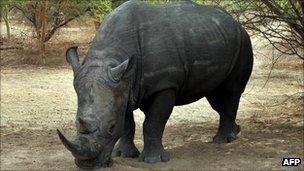UK to lead international rhino horn clampdown
- Published

There is so much demand for rhino horn that it is now worth £50,000 a kilo
The UK has secured an international agreement to curb the illegal trade in rhino horn, which is now being sold for more than diamonds, gold and cocaine.
Britain will lead global talks to fight myths about the curative powers of the product, amid what conservationists have warned is a "poaching crisis".
Environment Secretary Caroline Spelman said the trade was "cruel and archaic".
The agreement was reached at the Convention for International Trade in Endangered Species (CITES) in Geneva.
There is so much demand for rhino horn that it is now worth £50,000 a kilo.
'Peddled myths'
As part of the agreement, policing techniques and awareness campaigns will be shared by countries and conservation groups.
Experts say myths that rhino horn can cure cancer or help remedy strokes are fuelling demand for it in Asia.
Ms Spelman said: "Criminals trading in rhino horn have lined their pockets while bringing this magnificent animal to the brink of extinction, but their days are now numbered.
"We will be leading global action to clamp down on this cruel and archaic trade, and to dispel the myths peddled to vulnerable people that drive demand for rhino products."
The UK will support a workshop in South Africa in September to help develop better co-operation between countries where rhinos are poached and countries where their horns are sold.
Last September, after the UK's Animal Health agency detected a rise in the number of rhino horn products being sold through auction houses in Britain, it issued a warning that it would be refusing almost all applications to export such items.
It was feared that the legal export of "worked items", such as ornaments, created and acquired before June 1947, was being used to send rhino horn to Asia, where it is powdered and used for medicinal purposes.
Under rules brought in for the UK and then backed by the EU, export licences are now only granted under special circumstances.
Countries included in the steering group include the Democratic Republic of the Congo, Uganda, USA, South Africa, India, Kenya, Zimbabwe, Namibia and China.
- Published18 August 2011